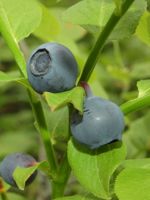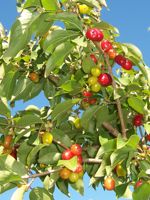Mon-Fri 9am - 5pm Mountain time
Cornelian Cherry Dogwood vs Bilberry
Vaccinium myrtillus
Cornus mas
CUSTOM GROW
NOT AVAILABLE THIS SEASON - MIGHT RETURN
Bilberry is a native perennial shrub valued for its small, blue-black berries that ripen in mid to late summer. The berries resemble blueberries but have a richer, more tart, and intense flavor. They have long been used for fresh eating, baking, and preserves, while also providing food for birds and mammals. In spring, its delicate pinkish flowers attract bees and other pollinators.
Growing low to the ground, Bilberry forms spreading colonies that create dense understory cover. This growth habit provides food and shelter for wildlife, and its foliage adds seasonal interest by turning red to purple in autumn. With its adaptability and ecological benefits, Bilberry is well-suited for naturalization, ecological restoration, and pollinator gardens.
Cornelian Cherry Dogwood is an ornamental plant with a variety of uses as it can be grown as a shrub, small tree, hedge, or privacy screen. The bright yellow flowers grow in clusters and bloom in late winter to early spring, providing an early food source for pollinators. They are visually striking as the flowers bloom before the leaves appear and last for several weeks.
Red, cherry-like fruits are produced in midsummer. They are edible but are better suited for preserves and syrups as the taste is fairly sour and astringent, similar to that of sour cherries and cranberries.
The Cornelian Cherry Dogwood was the winner of the Gold Medal Award from The Pennsylvania Horticultural Society as well as the Cary Award for having superior landscape appeal and for being winter hardy and pest resistant.
Bilberry Quick Facts
Cornelian Cherry Dogwood Quick Facts
Toxicity: leaves may be unsafe in high doses

